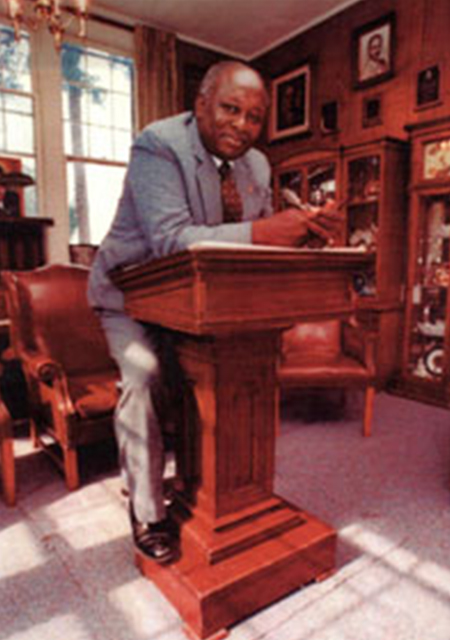Our Founder
Dr. James N. Eaton (1930-2004), founder and first director of the Black Archives, pictured in historic Carnegie Library posed behind an antique lectern used by famous guests visiting the campus of Florida A&M University. These special visitors included leaders such as Booker T. Washington, Mary McLeod Bethune, James Weldon Johnson, and Thurgood Marshall.
Dr. James N. Eaton
Early Life and Education
James Nathaniel Eaton, Sr., was born on September 14, 1930, in Richmond, Virginia. He earned both his bachelor’s and master’s degrees from Fisk University in Nashville, Tennessee. His persute of higer eucation led him to Fisk University, where he earned his Bachelor of Arts (B.A.) degree in 1952, followed byhis Master of Arts (M.A.) in 1959. [he would also later be conferred with an honorary Doctor of Humane Letters (L.H.D.) degree from Florida Memorial College in 1997 in recognition of his significant scholarly achievements.]
Academia and Leadership
After completing his post-graduate studies, James N. Eaton's career would be a multi-faceted journey. Initially, he served as a history professor at Miles College in Fairfield, a suburb of Birmingham, Alabama, from 1953 to 1955. In 1957, he transitioned to the role of assistant principal at the Hanover School for Boys in Richmond, Virginia. In 1958, He ultimately left the position to join Florida A&M University as a professor of history. During his time at FAMU, Eaton steadily progressed from being an instructor to becoming the chairman of FAMU’s ‘Department of History, Geography, and African-American Studies,’ where he served from 1969 to 1977. Simultaneously, he worked as an adjunct professor of History at Florida State University from 1970 until 1980.
Founding of the Archives
In 1975, James N. Eaton spearheaded the effort that ultimately gave rise to the creation of FAMU’s Black Archives. By 1976, the ‘Black Archives Research Center and Museum’ came into existence, and Eaton was recognized and appointed as its inaugural archivist, curator, and director.
For the next three decades, he helped amass a collection of memorabilia and printed records that now comprise one of the region’s most extensive collections of first-source material relating to the history, culture and contributions of people of African descent living in the United States. The diverse collection was built on the premise of his personal motto that “African-American history is the history of America.”
Legacy
Dr. Eaton gained national and international recognition for his work ands expertise in American, African-American, Southern, and Russian history. He was awarded "Most Outstanding Teacher of the Year" 25 times during his 45-year tenure at FAMU. Anyone fortunate enough to attend his classes or listen to one of his lectures was considered “Eatonized.”
In 1978, Dr. Eaton was named FAMU’s first “Distinguished Professor.” Notably, Dr. Eaton played a pivotal role in securing the historic Carnegie Library’s inclusion on the 'National Register of Historic Places' during its inaugural year as the permanent home of the black archives. Thanks largely to his efforts, FAMU’s campus, and its surrounding community, were designated a National Historic District in 1998.
In 1981, Dr. Eaton, with a group of dedicated community members, co-founded the Friends of the Black Archives, a non-profit volunteer group dedicated to the promotion and preservation of African-American history. It was founded to support and incite greater interest in the center and its public services. In 1983, the 'James N. Eaton, Sr. Endowment' was established to render further support to the museum and archives.
Awards and Recognition
The noted archivist, curator, educator, and historian was the recipient of hundreds of accolades and awards. Some of his most prestigious honors included being named “Professor of the Year” in 1991 by Florida’s Council for Advancement and Support of Education (CASE).
In 1997, Florida Memorial College bestowed upon him the Doctorate of Humane Letters. After nearly five decades of dedicated scholarship and public service, Dr. Eaton announced his retirement in 2003. That same year, the university bestowed upon him the title of Professor Emeritus.
Additionally, in 2003, in recognition of his dedication in the areas of education, American, African-American, and world history, a bill was introduced in the Florida Legislature that proposed naming the Southeastern Regional Black Archives Research Center and Museum expansion facility the Meek-Eaton Building in honor of Eaton and his close friend and colleague, U.S. Congresswoman Carrie P. Meek (b. 1926 – d. 2021), who helped secure funds for the new facility.




